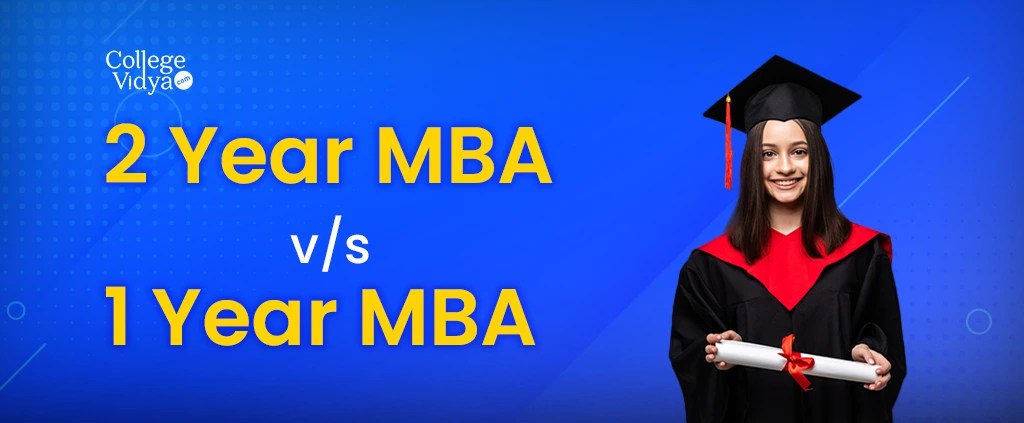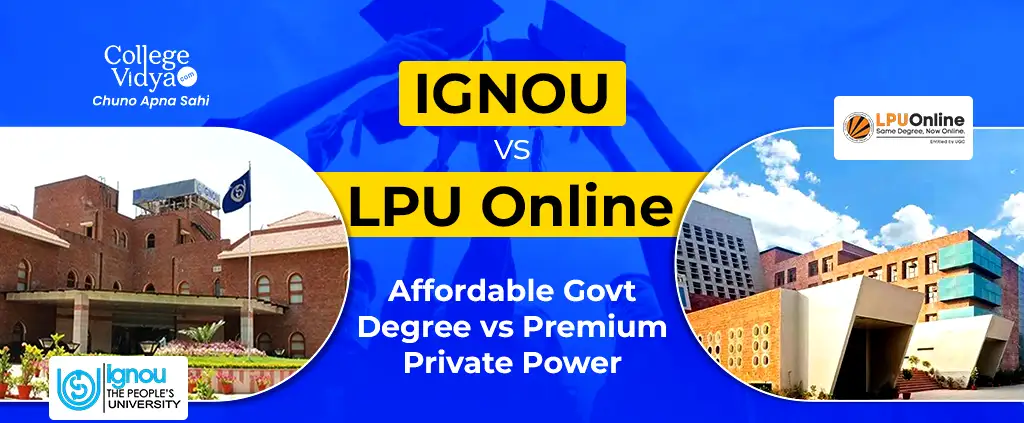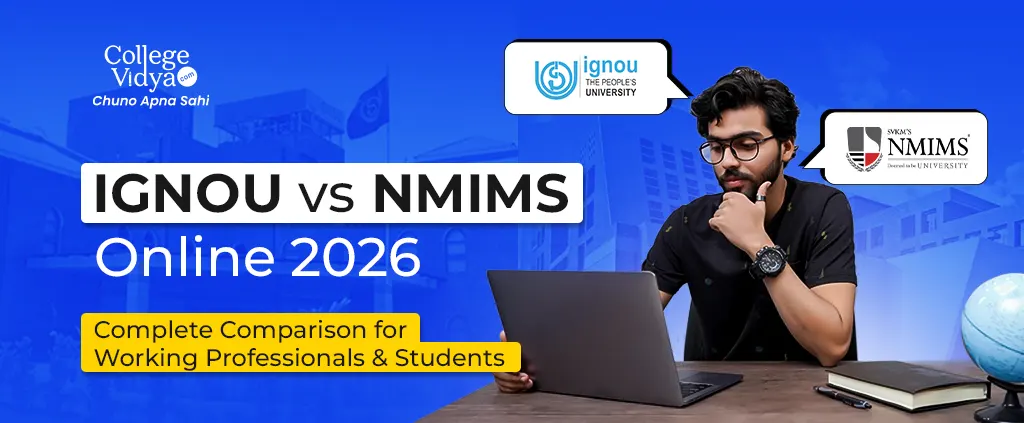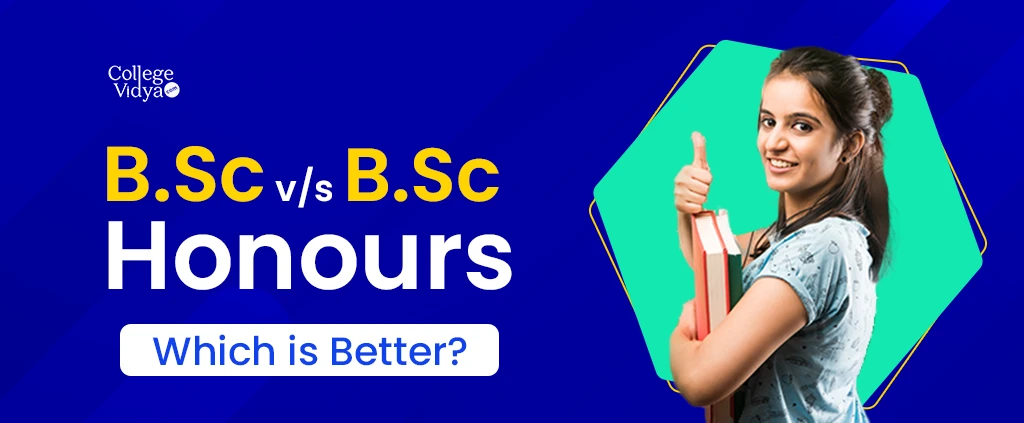Pursuing an MBA is a popular choice for individuals seeking to advance their careers in the dynamic business world. In India, many prestigious colleges offer both 2-year and 1-year MBA programs. Choosing between these options can be a crucial decision, as it can significantly impact your learning experience, career prospects, and personal development. In this blog, we will explore the differences between a 2-year MBA and a 1-year MBA, to help you make an informed choice for your future.
Which of the two programs is better, that will depend on your personal preferences and circumstances. To know which one is better for you particularly, you will have to understand the key differences. So, if you are confused about which one of the two to pursue, then read this article thoroughly and make a judicious choice yourself, rather than getting swayed by others’ opinions.
1-Year MBA v/s 2-Year MBA
The course duration is not the only difference between 1 year MBA and 2 year MBA. The major difference is what you are going to consume during the course of the two programs. A 2 year MBA is a general MBA program where you study and experience the concepts in great detail. You get the time and opportunity to explore with the help of internships and practical training.
On the other hand, a 1 year MBA is actually an Executive MBA program meant for people with work experience in the corporate culture. For people with work experience, a 1 year MBA is a chance to learn leadership and related skills so that they can be promoted to higher management level positions.
The 1 year MBA program is a highly intensive course with a packed curriculum to be completed within 12 months. So, a 1 year MBA is suitable for professionals who have a clear goal and know exactly what they wish to learn and experience.
On the other hand, a 2 year MBA is a descriptive course which includes internships, vocational training, and industry exposure. The course is for a span of 2 years including 4 semesters that includes both academic and industry learning. So, a 2 year MBA course is suitable for fresh graduates who are yet to explore and are unsure about the path to follow.
Following is a detailed differentiation of the two programs:
|
Category |
2-Year MBA |
1-Year MBA |
|
Duration |
A 2-year MBA typically spans four semesters. The option is good for those wishing to learn Business Administration right from the basics to explore their career options. |
A 1-year MBA is an accelerated program that typically covers the same curriculum in just two semesters. The condensed schedule of a 1-year MBA can be an attractive option for professionals who want to return to the job market quickly or have specific time constraints. |
|
Curriculum and Specialisation |
The curriculum in both programs generally covers fundamental business subjects such as finance, marketing, operations, human resources, and strategy. However, 2-year MBAs may offer more extensive elective choices, allowing students to specialise in specific areas. This flexibility can be beneficial for those who wish to explore diverse fields within business administration. |
A 1-year MBAs may have a fixed and more focused curriculum, often tailored to experienced professionals seeking to enhance their existing skill set or transition to a different industry. These programs might be particularly appealing to those who already possess a strong foundation in business concepts and are looking for specialised knowledge. |
|
Time Commitment |
While a 2-year MBA offers a more comprehensive learning experience, it requires a longer break from the job market. |
One of the significant advantages of a 1-year MBA is the reduced time commitment. A 1-year MBA allows students to minimise their time away from work, which can be advantageous for individuals who are financially constrained or eager to re-enter the workforce promptly. |
|
Experience and Background |
Your prior work experience and educational background play a crucial role in determining the suitability of each program. A 2-year MBA often caters to fresh graduates or individuals with limited work experience who are looking to develop a strong foundation in business principles and gain exposure to various industries. |
On the other hand, a 1-year MBA is better suited for mid-career professionals with substantial experience in the corporate world. These programs typically assume that students have a working knowledge of business concepts, and they build on this expertise by offering advanced, industry-specific courses. |
|
Networking Opportunities |
The duration of the program can also influence the extent of networking opportunities. A 2-year MBA allows for a more extended period of interaction with peers, professors, and industry experts. This extended network-building phase can be advantageous in the long run as it provides a broader range of connections and potential job opportunities. |
Although a 1-year MBA may have a shorter networking window, these programs often attract experienced professionals who bring a wealth of diverse industry connections to the classroom. Networking within a smaller, more experienced cohort can be equally valuable, especially for those seeking to pivot their careers or secure leadership roles within their current field. |
|
Fees Considerations |
The cost of an MBA is a critical factor for many candidates. The average fees of a 2 year MBA program in India is INR 20-25 lakhs. |
Generally, a 1 year MBA is less expensive than its 2-year counterpart due to the shorter duration. The average fees of a 1 year Executive MBA program in India is INR 8-15 lakhs. |
In conclusion, both 2-year and 1-year MBA programs in Indian colleges have their unique advantages and cater to different sets of students. A 2-year MBA provides a comprehensive education and is ideal for fresh graduates or those looking to explore various aspects of business administration. On the other hand, a 1-year MBA offers an accelerated and specialised curriculum for experienced professionals aiming to fast track their careers or pivot within their industries.
Which is Better: 1-Year MBA or 2-Year MBA?
Determining which of the two options- 2-year MBA or 1-year MBA, is better depends on various factors and individual circumstances. There is no definitive answer as the choice that suits one person might not be the best fit for another. Let's consider some key factors that can help you decide which option is better for you:
- Work Experience: If you are a recent graduate or have limited work experience, a 2-year MBA can be advantageous. It provides a more comprehensive learning experience, exposure to various industries, and ample time for internships and networking. However, if you are an experienced professional with a well-established career, a 1-year MBA may be more suitable as it allows you to fast-track your education and re-enter the workforce quickly.
- Career Goals: Your career objectives play a significant role in this decision. If you want to explore different business functions, industries, or switch to a new field, a 2-year MBA provides the time and flexibility to do so. On the other hand, if you have a clear focus on a specific area and seek in-depth knowledge and expertise in that domain, a 1-year MBA with a specialised curriculum might be a better fit.
- Financial Considerations: A 1-year MBA is typically less expensive than a 2-year MBA due to its shorter duration. If cost is a significant concern for you, a 1-year MBA might be the more affordable option. However, it is essential to evaluate the potential return on investment in terms of salary increase and career advancement opportunities for both options.
- Networking Opportunities: The duration of the program can affect the extent of networking opportunities. A 2-year MBA provides a more extended networking window, which can be advantageous in building a broader and diverse network of contacts. On the other hand, a 1-year MBA can offer a more concentrated and industry-specific network, particularly if you are looking to make connections with experienced professionals.
- Learning Pace: Consider your learning style and ability to handle an accelerated program. A 1-year MBA requires a focused and intensive commitment to learning, whereas a 2-year MBA offers a more gradual and paced approach.
- Life Stage and Commitments: Personal life and commitments should also be factored in. If you have family responsibilities or other time constraints like work commitments, a 1-year MBA might be a more practical option. However, if you are in a position to invest two years into your education, a 2-year MBA can offer a deeper learning experience.
- Job Market and Industry Trends: Consider the job market and the specific industries you are interested in. Research how employers perceive and value both types of MBA programs in your desired field.
In the end, the "better" option is the one that aligns most closely with your career goals, suits your work experience, financial capacity, and personal preferences. It's essential to conduct thorough research, speak with alumni and current students, and seek guidance from professionals in your field to make an informed decision. Both 2-year and 1-year MBA programs have their merits, and ultimately, your dedication and effort during the program will play a significant role in determining your success post-graduation.
Types of MBA
There are different types of MBA programs in terms of the mode of delivery of the program. Both 2 year and 1 year MBA courses can be pursued in the regular offline mode and in online mode. Since the breakout of the Covid-19 pandemic, online education has made a remarkable turn in the education sector.
- Regular MBA- A regular MBA program is what you already know, a traditional full-time classroom program delivered offline on university campus. You can do both 2 year MBA and 1 year MBA in regular mode. The 2 year MBA is known as the General MBA (unless it is in a specific specialisation) while the 1 year MBA program is called the Executive MBA program as it is designed for working professionals.
- Online MBA- As evident from the name, an online MBA is a course delivered in the online mode. The course is the same as a regular MBA but the delivery is completely online through a digital platform known as the Learning Management System (LMS). Again, you can pursue both 2 year MBA and 1 year MBA in the online mode.
There are multiple advantages of online education and especially when we talk about an MBA program. This is because an online MBA will provide the students with ample time that can be used in skill enhancement through practical activities like internships, industrial projects, extra skill-development certificate courses, a job, etc.
And for people with jobs who are looking for a 1 year Executive MBA, an online executive is an incredible opportunity as they do not have to leave their jobs to pursue MBA. Working professionals can pursue both their jobs and the MBA program together because an online Executive program is highly flexible because of the audience it caters to, which are working professionals with busy schedules and work commitments.
The benefit of a regular MBA is that you get to network face-to-face with your peers and professors. The experience and exposure of face-to-face interactions is different and you get to experience the joys of college all over again after your bachelor’s degree.
What is Online 1 Year MBA? Is it Worth It?
An online Executive MBA (Master of Business Administration) is a graduate-level business degree program designed for experienced professionals and executives who want to enhance their leadership and managerial skills while continuing to work full-time. It is similar to a traditional Executive MBA program but offers the convenience and flexibility of online learning, allowing students to study from anywhere with an internet connection.
The curriculum of an online Executive MBA typically covers core business topics such as finance, marketing, operations, strategy, and leadership. However, it is often tailored to the specific needs of experienced professionals, focusing on real-world applications and case studies.
Is it worth it? The value of an online Executive MBA depends on several factors. Ultimately, the decision of whether an online Executive MBA is worth it depends on your individual circumstances, career goals, financial situation, and the specific program you choose. Read the following benefits of pursuing the 1 year online Executive MBA to determine whether it is worth it for you or not.
Benefits of Online 1 Year MBA
Pursuing an online Executive 1 year MBA (EMBA) can offer several benefits, making it an attractive option for professionals seeking to advance their careers while managing work and personal commitments. Some of the key benefits include: 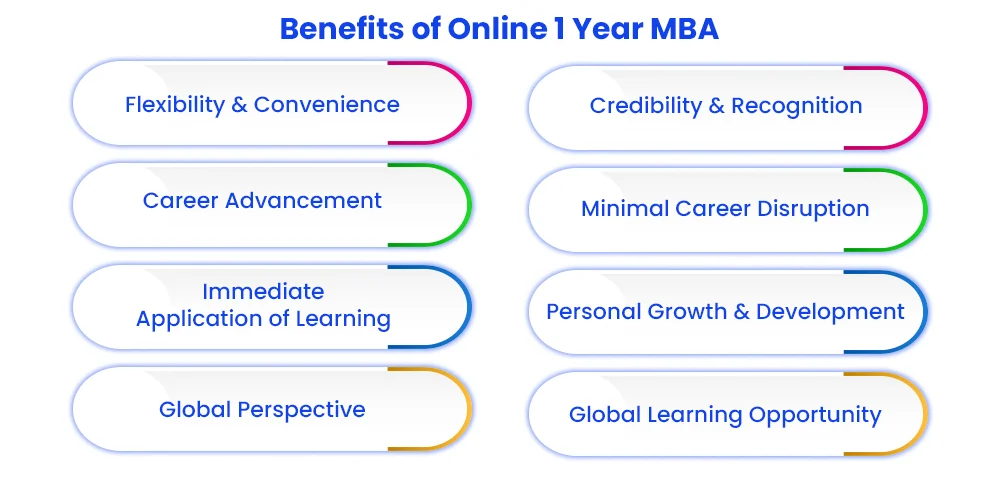
- Flexibility and Convenience: Online EMBA programs allow you to study at your own pace and schedule, which is particularly beneficial for working professionals who cannot commit to a full-time on-campus program. You can access course materials, lectures, and assignments from anywhere with an internet connection, making it easier to balance work and studies. Universities provide a Learning Management System (LMS) which is like a virtual classroom for all academic activities.
- Career Advancement: An Executive MBA is designed for professionals with significant work experience, typically ranging from 3 to 10 years. This advanced degree can equip you with strategic management and leadership skills, enabling you to take on more significant responsibilities within your organisation or make a career transition.
- Immediate Application of Learning: As an EMBA student, you can apply the knowledge and skills you acquire in real-time to your current job. This practical approach to learning ensures that you can implement and test business concepts and strategies in a professional setting, enhancing the relevance and impact of your education.
- Global Perspective: Many online EMBA programs have a global focus, incorporating case studies and examples from various industries and regions. This exposure to international business practices can broaden your perspective and help you become more adept at handling global business challenges.
- Credibility and Recognition: Earning an Executive MBA from a reputable business school can enhance your professional reputation and open doors to new career opportunities. Employers often value the skills and knowledge gained through an EMBA program, giving you a competitive edge in the job market.
- Minimal Career Disruption: Since online EMBA programs are designed for working professionals, they allow you to continue working full-time while pursuing your degree. This reduces the financial impact of leaving your job to study full-time and ensures a smoother transition between work and academics.
- Personal Growth and Development: Beyond career advancement, an EMBA can lead to personal growth and increased self-confidence. Through the program, you'll develop critical thinking, decision-making, and problem-solving skills, which can be applied not only in your professional life but also in personal situations.
- Global Learning Opportunity: Since the mode is completely online, you have the opportunity to pursue the course from universities abroad. You can complete the course from a foreign university without actually going abroad and from the comfort of your home. There are several online platforms that help you connect with universities abroad for global online MBA programs.
Career Scope, Jobs, & Salary After 1 Year Executive MBA
The career scope after pursuing an online Executive MBA (EMBA) is generally promising and can lead to various leadership and managerial roles across different industries. The specific job roles and their respective salaries can vary based on factors such as your prior work experience, industry, location, and the reputation of the business school from which you earned your EMBA.
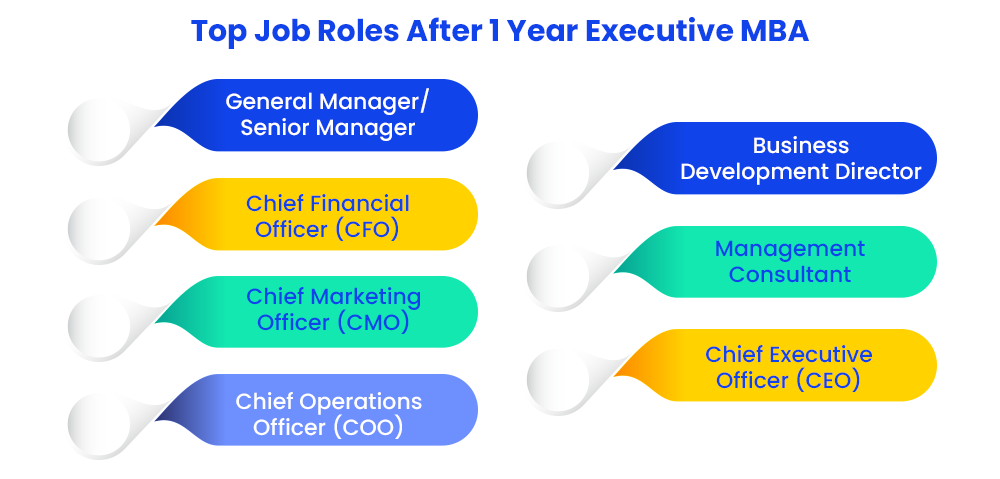
The Indian job market is diverse, and there is a demand for skilled professionals with executive-level management and leadership expertise. Here are some potential career opportunities and their respective salary ranges in India after completing an EMBA. The salary ranges are from the lowest average to the highest, which depends on the company’s size and industry.
|
Job Role |
Average Salary Package |
|
General Manager/ Senior Manager |
INR 10-30 LPA |
|
Chief Financial Officer (CFO) |
INR 15-50 LPA |
|
Chief Marketing Officer (CMO) |
INR 10-40 LPA |
|
Chief Operations Officer (COO) |
INR 12-40 LPA |
|
Business Development Director |
INR 8-25 LPA |
|
Management Consultant |
INR 6-20 LPA |
|
Chief Executive Officer (CEO) |
INR 50 Lac to 1 Crore per annum |
It's important to remember that these salary ranges are approximate and can vary based on factors like the company's location, industry, economic conditions, and individual negotiation skills. Additionally, salary expectations in India are typically lower compared to Western countries due to differences in the cost of living and economic factors.
|
|
|
|
|
|
|
|
|
|
|
|
When considering career opportunities after an EMBA in India, it's essential to research the job market and industries that interest you, connect with alumni and industry professionals, and leverage networking to explore and pursue suitable positions.
Best Colleges for Online 1 Year MBA
There are many reputed institutions like IIMs, SP Jain, etc, that offer online certificate courses and advanced diploma in Management courses. However, there are a select few that offer a full-fledged 1 Year Online MBA program. It is very important to find a well-recognized and accredited institution as it can significantly enhance your career prospects in India.
1) OP Jindal Global University, India- One of the top Indian universities for the online 1 Year MBA course is O.P. Jindal Global University. The university has been recognised as the “Institution of Eminence” by the Ministry of Education (MoE).
The candidate must have a bachelor’s degree in any domain with at least 50% marks to be eligible for admission. The university offers a total of 4 specialisations- Marketing, Finance, Strategy & Leadership, and Digital Finance.
The course is delivered through blended learning that includes both live and recorded classes. There is dedicated support to the online learners. Students get to learn from world-class faculty. The university focuses on practical learning through experiential projects and business case studies from around the world. The best part is that the course is quite affordable with the total fees less than INR 2 lakh for the complete course.
2) Deakin Business School, Australia- The Deakin Business School is one of Australia’s best business schools. The university has accreditation from AACSB and EQUIS to offer the online 1 year MBA program. The university is among the top B-schools globally.
The candidates applying to Deakin Business School must have at least 3 years of full-time work experience to be eligible for admission to the course. The candidates can apply through the platform of Upgrad that helps you connect to the university and pursue the course.
The university also gives the enrolled students an opportunity to visit the campus in Australia for a 1-week on-campus immersion program. This is completely optional and has a separate cost other than the course fees. The total fees for the course is around INR 4 lakh. After completion of the course, you will get the MBA (Global) degree from the Deakin Business School. You will also get the alumni status of this prestigious global institution.
Top Specialisations for Online 1 Year MBA
Some of the top specialisations that are in demand in the current industry for a 1 year online Executive MBA program are:
1) Finance
- Financial Modelling and Data Visualisation
- Project Finance
- Behavioural Finance
- Principles of Financial Regulation
2) Digital Finance
- Introduction to Digital Finance
- Managing Fintech Ecosystems
- Blockchain and Cryptocurrency
- Financial Analytics
3) Marketing
- Consumer Behaviour
- Services Marketing
- Design Thinking
- Artificial Intelligence
4) Strategy and Leadership
- Strategic Management
- International Business
- Entrepreneurship & New Venture Creation
- Leadership Essentials for Business
|
|
|
|
|
|
|
|
|
|
|
|
Conclusion
Ultimately, the decision between a 2-year MBA and a 1-year MBA should depend on your career goals, work experience, financial considerations, and personal preferences. Conduct thorough research, talk to alumni and current students, and consider your long-term career aspirations to make the right choice that aligns with your professional journey. Whichever path you choose, an MBA from a reputable Indian college can be a significant stepping stone towards a successful and rewarding career in the business world.
Also, we have mentioned the perks of pursuing the online MBA programs, specifically the online 1 year MBA program. For your reference, we have also mentioned the top universities in India and abroad from where you can pursue this course.
Lastly, before enrolling in an online EMBA program, it's essential to research various schools, check their accreditation, and assess the program's curriculum to ensure it aligns with your career goals and expectations. Additionally, consider factors such as program duration, faculty reputation, and alumni success to make an informed decision.

